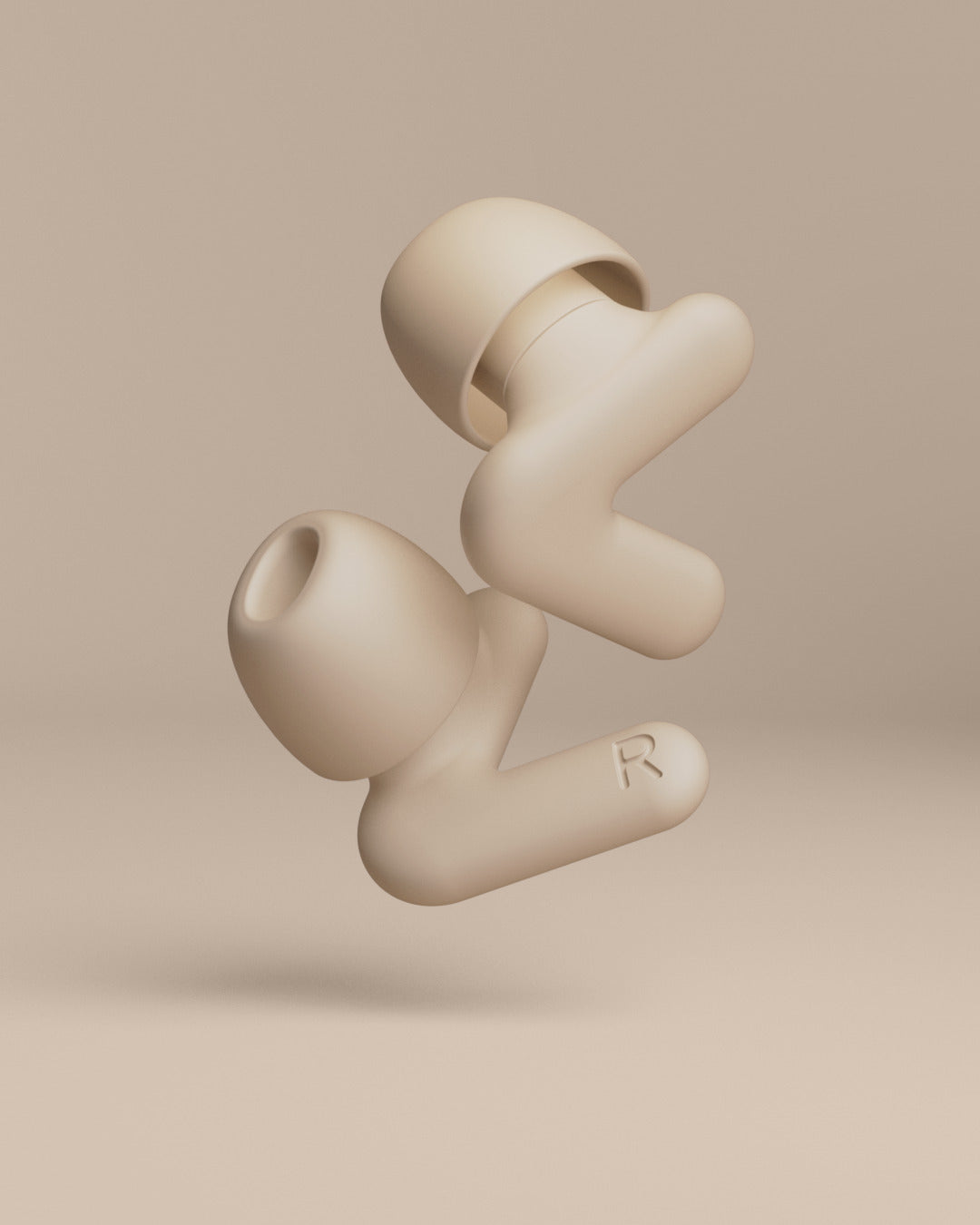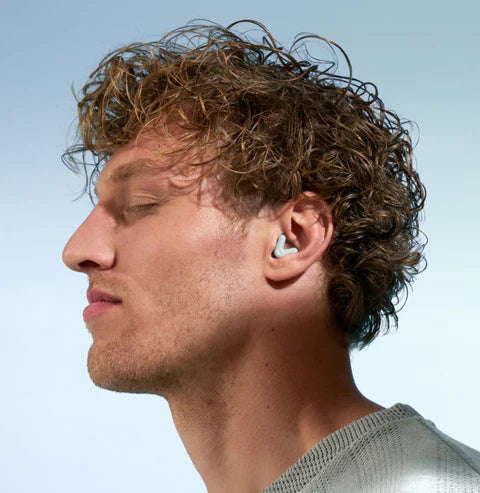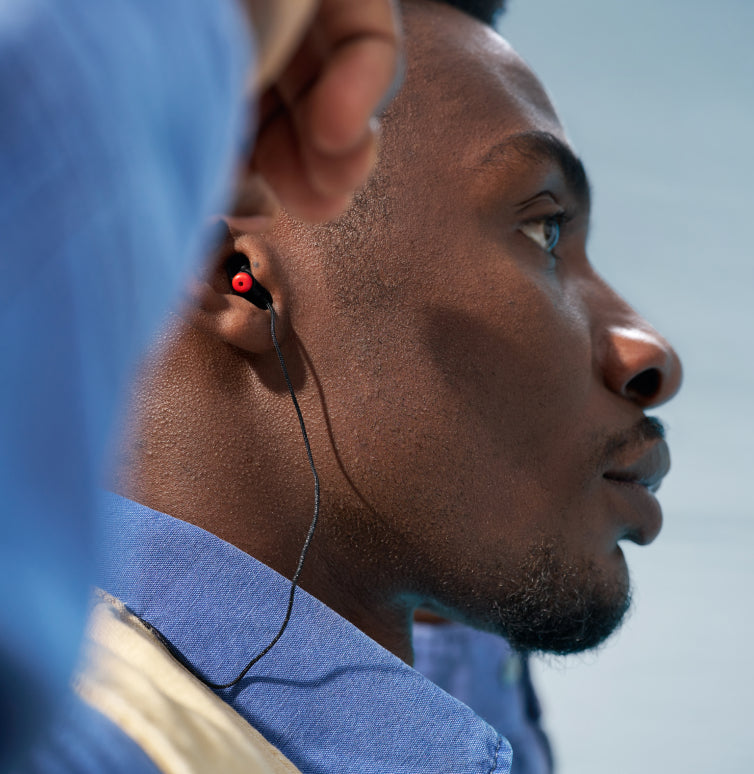A ringing noise in your ears can suddenly develop after a festival, as a result of stress or even when you have a cold. It's often harmless and temporary, but sometimes the ringing persists and becomes a constant part of your everyday life. You certainly don't want that to happen. Read all about the possible causes, what you can do about it and when best to seek medical attention. Whether you suffer from a slight ringing in your ears when in quiet surroundings, a high-pitched ringing after a party that was a little too loud or a constant ringing in your ears: we will be happy to help restore peace and quiet for you.
What does a ringing in your ears mean?
A ringing in your ears, also known as tinnitus, is a noise you hear when no external sounds are present. The type of noise can vary: from a high-pitched ringing to a hum or buzz. It's different for everyone. The ringing may be temporary, for example after exposure to loud music, or chronic due to permanent hearing damage or stress.
What exactly do you hear when you have a ringing in your ears?
Many people describe the noise as:
- A high or low-pitched ringing
- A soft buzzing or hissing
- A whistling or humming
- A slight ringing in quiet surroundings
Sometimes you only hear it when it's very quiet, for example when you go to bed. In other cases, it's continuous.
When is the ringing in your ears temporary and when is it chronic?
A temporary ringing in your ears often goes away by itself within a few hours to days, especially if it's caused by loud music, ear pressure or a cold. If the ringing persists for more than three months, we call it chronic tinnitus.
Is a ringing in your ears the same as tinnitus?
Yes, in most cases it is. Tinnitus is the medical term for hearing sounds that are not present. But rest assured: not all ringing noises mean you have tinnitus, although long-term symptoms often do.
What are the causes of a ringing in your ears?
The cause of a ringing in your ears varies from person to person. These are the most common triggers:
Stress
Prolonged stress has an enormous impact on your body, including your hearing. Tension causes your nervous system to become overstimulated, which can exacerbate or even cause tinnitus. The ringing then becomes especially obvious, especially at quiet times such as in the evening.
A cold or pressure in the ears
The pressure in your ears can change when you have a cold or the Eustachian tube is blocked. This sometimes results in a muffled feeling or temporary hearing loss but can also cause an annoying ringing in your ears. This usually disappears when you recover.
Noise or hearing damage
Loud music is one of the main causes of a temporary or permanent ringing in the ears. You may experience a temporary ringing in your ears after a night out, attending a festival or listening to music at a high volume on your headphones. Repeated exposure without hearing protection can lead to permanent hearing damage. Protect your ears when you go out by using high-quality earplugs for concerts and festivals.
Earwax: could it really be responsible?
Absolutely. Excessive or impacted earwax can muffle sound and exert pressure on the eardrum. This can lead to a ringing in the ears caused by earwax. In such cases, cleaning your ears (or having them cleaned) may help.
What can you do about a ringing in your ears?
If you suffer from a ringing noise, it's important to give your body and hearing a rest. In the short term, the following may provide a solution to the ringing in your ears.
- Adjust the ambient noise: quiet background noise, a fan or white noise can help.
- Reduce your stress levels: breathing exercises, walking or yoga can be relaxing. Do whatever you find works for you.
- Get enough sleep: fatigue often makes the ringing worse.
- Use comfortable earplugs for sleeping to muffle background noise and sleep better.
How can you protect your hearing?
Prevention is of course better than a cure. Because no one wants an annoying ringing in their ears. Effective hearing protection is extremely important:
- Wear earplugs at concerts and festivals, in clubs or when doing jobs that involve a lot of noise.
- Use earplugs with a music filter: these reduce harmful noise without lessening the fun.
- Protect your child's ears - better too early than too late. Children's hearing is still developing and therefore especially vulnerable to loud noises. Hearing protection is not an unnecessary luxury, even at a young age. The Alpine Muffy Kids earmuffs give your child comfortable and reliable protection - ideal for use at school, while travelling or at home. Better to protect their ears now than regret not doing so later!
When should you seek medical assistance?
A ringing in your ears is usually harmless, but in the following cases it's a good idea to consult your GP:
- If the ringing appears suddenly and has no apparent cause.
- If you also experience hearing loss, dizziness or earache.
- If the ringing fails to improve after a week.
- In the case of psychological complaints such as anxiety or insomnia caused by the ringing.
A GP may be able to refer you to an ENT doctor or hearing clinic for further tests.
FAQs about a ringing in your ears
How long does a ringing in your ears last?
This varies from person to person. A temporary ringing may disappear after a few hours. A chronic ringing often lasts longer but the right support can help you cope with it better.
Is a ringing in your ears dangerous?
Not in most cases, no. However, it's important to rule out hearing damage or other medical causes. If the ringing persists, you may experience mental and emotional symptoms as well.
Can the ringing in your ears disappear?
Yes, especially if the cause is temporary, such as noise, stress or earwax. In the case of chronic tinnitus, it rarely goes away completely but the nuisance it causes can be reduced significantly.
What should you do when you have a ringing in your ears?
Give your ears a rest, protect them properly and seek medical attention if it persists. With the right approach, you will regain control of your hearing as well as your peace of mind.




